
|
July 2009 Volume 15, Number 2
|
Back Issues:
http://solarcooking.wikia.com/scr |
[Editor's note: E-mail your news items to info@solarcookers.org or via postal mail to Kevin Porter, Solar Cookers International, 1919 21st Street #101, Sacramento, California 95811-6827, USA. We want to hear from you — especially if your program is growing or if your work has not been featured in the Solar Cooker Review before. Please include your contact information. Submissions are subject to editing if printed.]
AFRICA
The Gambia
Reports in the Daily Observer newspaper indicate that Gambian President Yahya Jammeh is aware of solar cookers and has discussed solar cooker use in his country. During a 2008 meeting with representatives of Motech Industries, Inc., a leading solar power company based in Taiwan, Jammeh expressed his support for solar energy use, including his desire that “98% of provincial schools have solar power so that they can link to the Internet.” In response to a question from the reporter, Jammeh mentioned that solar cookers are very much a possibility for his country as well.
Senegal
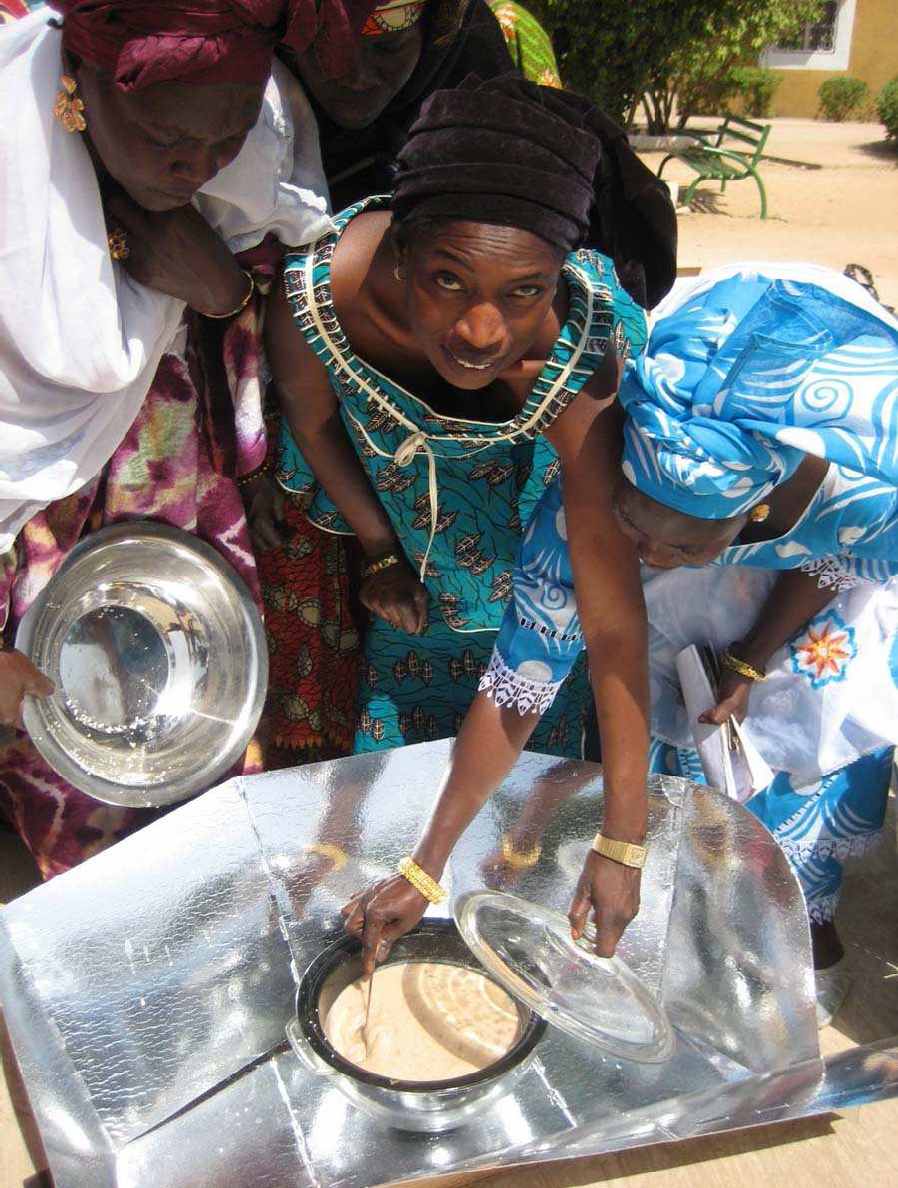 |
| Solar cooking trainer Kiné Seck demonstrates how to use the HotPot as part of the Senegal Solar Cooking Initiative |
 |
| Large, sturdy solar box cookers manufactured by local craftsman are being distributed in Mékhé |
Senegal / Belgium
 |
| Villagers near Djoudj National Park will not have to spend as much time collecting firewood if they regularly use solar cookers |
ASIA AND OCEANIA
Bangladesh / United Kingdom
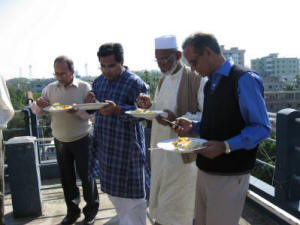 |
| “They are hooked!” |
Malaysia
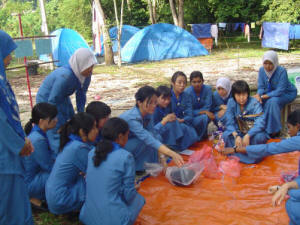 |
| Joyce Ong Choon Kim explains to a group of Cadets how a transparent, heat-resistant bag maintains cooking temperatures around a dark colored pot |
Thailand
 According to the Bangkok Post newspaper, Sila Sutharat has operated a
solar-powered chicken roasting stall in the Muang district of Phetchaburi since
1992. He splits and hangs chickens vertically against a grill that faces
hundreds of small concave mirrors reflecting sunlight at the grill and creating
heat so intense that the chickens start to smoke in just a few seconds. Sila
says he can roast up to 50 1.6-kilogram chickens between the hours of 7 a.m. and
11 a.m., taking just 10-15 minutes each in good sun. (The stall is not open
during rain.) Though the reflector array cost 30,000 baht to build, he has no
fuel expenses and is able to sell the chickens for 160 baht each. Sila has even
received an honorary bachelor’s degree in “production technology” from
Phetchaburi Rajabhat University for his inventiveness.
According to the Bangkok Post newspaper, Sila Sutharat has operated a
solar-powered chicken roasting stall in the Muang district of Phetchaburi since
1992. He splits and hangs chickens vertically against a grill that faces
hundreds of small concave mirrors reflecting sunlight at the grill and creating
heat so intense that the chickens start to smoke in just a few seconds. Sila
says he can roast up to 50 1.6-kilogram chickens between the hours of 7 a.m. and
11 a.m., taking just 10-15 minutes each in good sun. (The stall is not open
during rain.) Though the reflector array cost 30,000 baht to build, he has no
fuel expenses and is able to sell the chickens for 160 baht each. Sila has even
received an honorary bachelor’s degree in “production technology” from
Phetchaburi Rajabhat University for his inventiveness.
Vietnam

|
| Solar Serve’s parabolic solar cooker is being deployed in the village of Hoa Quy |
LATIN AMERICA AND IBERIA
Brazil
Jose Albano reports that a government-sponsored solar box cooker workshop conducted by Paulo Araujo was featured on a Globo TV national news broadcast. Contact: Paulo Araujo, Labotario de Energia, Instituto de Tech e Pesq., Universidade Tiradentes, Av. Murilo Dantas, 300, Farolandia, 49032-490, Aracaju, Sergipe, Brazil. E-mail: paulo_mario@unit.br
NORTH AMERICA AND EUROPE
France
French personality Jerome Bonaldi introduced several models of solar cookers to a national, prime time television audience during a technology segment on the France 2 network. To view the segment, visit http://youtube.com/watch?v=qRPZ2gg_KBU
Mexico
Solar Household Energy, Inc.’s Richard Stolz reports that 400 HotPot solar cookers were provided to victims of the floods that ravaged the southern state of Tabasco in late 2007. “In addition to the devastation caused to homes, the floods knocked out Tabasco’s electricity and gas distribution plant. As a result, even after flood waters had receded, many residents had no means of cooking food, particularly when firewood was unavailable.” The HotPots were made available by two of Solar Household Energy, Inc.’s partner organizations, the Mexican Fund for the Conservation of Nature, and International Logistics Solutions, which manufactures HotPots in Mexico. Contact: Solar Household Energy, Inc., P.O. Box 15063, Chevy Chase, Maryland 20815, USA, Web: http://she-inc.org
Switzerland
Ulrich Oehler’s pioneering work in the 1980s inspired a wave of Swiss solar cooking promoters. For many years, Oehler’s house in Basel even served as the country’s main solar cooker information center, maintained by the ULOG group. From 1997 to 2007, the Centre Neuchâtelois de Cuisine Solaire (CNCS) in the small town of Neuchâtel served as the country’s information hub. Visitors could see a variety of solar cooker models or ask questions of the centre’s leader, Michael Götz. In addition to this resource, ULOG group and GloboSol maintain a travelling solar crêperie in which they prepare solar pancakes for music festivals and ecology fairs throughout Switzerland.

|
| A traveling solar crêperie nourishes festival-goers while raising awareness about solar cooking |
United Kingdom
 Paul Booth writes, “I’ve made a solar funnel cooker out of wood, using old
beverage cans — cut open, flattened and then stapled to the wood — as
reflectors. They appear durable and weatherproof, and cost nothing. I am
achieving temperatures of 95˚C+ during an English winter! I hope this
information is of use to other people.”
Paul Booth writes, “I’ve made a solar funnel cooker out of wood, using old
beverage cans — cut open, flattened and then stapled to the wood — as
reflectors. They appear durable and weatherproof, and cost nothing. I am
achieving temperatures of 95˚C+ during an English winter! I hope this
information is of use to other people.”
United States
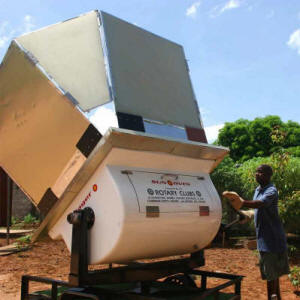 |
| A goal of the Sun Catchers Project is to bring village-size solar ovens to institutions in developing countries |
 |
| Elementary school students made solar-baked sweet potato fries at the California Agriculture Day celebration |
 |
| Governor Arnold Schwarzenegger enjoys his first taste |
 Solar cooking is usually done in relatively simple solar thermal devices that
convert sunlight into heat energy. Stefano’s Solar Powered Pizza in Mill Valley,
California, however, “solar cooks” using photovoltaic panels that power electric
ovens. In 2004, they installed a 26.5 kilowatt system that generates 100% of
their electric needs. Though the system cost $111,000 (after rebates), their
monthly electric bill dropped from nearly $1000 per month to less than $10. They
expect the system to pay for itself in about nine years, long before the 40-year
estimated lifespan is reached. Contact: Stefano’s Solar Powered Pizza, 11 East Blithedale Avenue, Mill Valley,
California 94941, USA. Tel: (415) 383-9666, e-mail:
info@stefanosolarpizza.com,
Web: http://stefanossolarpizza.com
Solar cooking is usually done in relatively simple solar thermal devices that
convert sunlight into heat energy. Stefano’s Solar Powered Pizza in Mill Valley,
California, however, “solar cooks” using photovoltaic panels that power electric
ovens. In 2004, they installed a 26.5 kilowatt system that generates 100% of
their electric needs. Though the system cost $111,000 (after rebates), their
monthly electric bill dropped from nearly $1000 per month to less than $10. They
expect the system to pay for itself in about nine years, long before the 40-year
estimated lifespan is reached. Contact: Stefano’s Solar Powered Pizza, 11 East Blithedale Avenue, Mill Valley,
California 94941, USA. Tel: (415) 383-9666, e-mail:
info@stefanosolarpizza.com,
Web: http://stefanossolarpizza.com
 |
| Sharon Cousins (far right) with the Roots & Shoots club and their new EZ-3 solar cookers |
 |
| The EZ-3, shown with additional front reflector, is completely enclosed in a transparent, heat-resistant bag |
United States / Mozambique
John Tillman and Drew Durbin, both recent graduates of Brown University, learned
about solar cookers while building and testing biogas stoves in
Tanzania. They
were inspired, and in 2008 formed SolarCycle, an organization that develops
low-cost solar cookers and water pasteurizers that reduce environmental damage
and health problems associated with cooking smoke and contaminated drinking
water.
According to SolarCycle, Tillman and Durbin designed a “revolutionary material”
consisting of three layers: a substrate of fused recycled plastic grocery bags,
a reflective layer of postindustrial metalized packaging film, and a transparent
protective layer. The material can be used to build durable, inexpensive solar
cookers and pasteurizers that “turn an urban trash problem into a potential
solution for diarrheal illnesses and respiratory diseases.”
SolarCycle’s cooker is stamped out of a sheet of SolarCycle reflective material
and assembled into the shape of an inverted cone with a flat bottom. The cone is
3 feet in diameter at the top, 9 inches in diameter at the bottom, and stands
two feet tall, while the sides are angled 30 degrees from vertical. The cooker
is expected to cost about $5.
The SolarCycle team has entered social entrepreneurship business plan
competitions at numerous universities and has been extremely successful, winning
first prize at Rice, Colorado State University, Georgetown, and the University
of Wisconsin, as well as beating out over 1,000 entries for the Chartered
Insurance Institute’s “Big Idea” competition. SolarCycle’s winnings — in excess
of $70,000 — have enabled it to open an office and purchase industrial
machinery.
SolarCycle is currently field testing its solar cookers and methods in Pemba,
Mozambique. Contact
SolarCycle by e-mail:
info@solarcycleafrica.com. Web:
http://solarcycleafrica.com
by Margaret Owino, SCI eastern Africa director
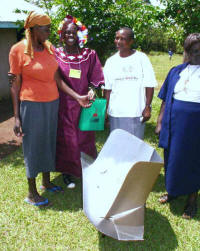 |
| Elizabeth Oranga (center) earns income by demonstrating and selling solar cookers in her community |
MAMA SOLAR …
Nearly a year after the evaluation of Solar Cookers International’s Sunny Solutions project in Nyakach, Kenya, several “mama solars” are still going strong, sharing the knowledge and skill that the sun can cook food and pasteurize water. These entrepreneurial women formed the backbone of the project, leading demonstrations and selling solar CooKits throughout the community. Thus, they each came to be known as mama solar.
Elizabeth Oranga, who is featured in the Suncookers film as a mama solar, and her colleagues Pamela Tambo from the southern zone, and Jesca Ochieng’, Seline Osian and Mary Okongo’ from the northern zones are all doing their bit to continue making solar cookers available in Nyanza province.
These energy entrepreneurs have taken solar CooKits and heat retention devices (fireless cookers) as their main trade items. They report great interest in the technologies beyond Nyakach in areas they are targeting. Elizabeth reports that she has conducted demonstrations and made sales in four areas this year: Karungu (three CooKit sets sold), Rongo (five), Oyugis (four), and Gwasi (five). Jesca conducted demonstrations in Kendu Bay, selling 10 sets to an orphanage, and in Asembo, where she had six sales. Seline and Mary have each sold two sets this year, in Katolo and Siaya respectively.
When asked about what motivates these women, they respond that they are interested in the work, they love solar cooking, and they would like many other people to also know about and buy the CooKits. They are also motivated by the small profit they make, as well as the fact that they are making a valuable contribution to their community and Kenya at large.
When asked how she communicates with groups quite far away, Elizabeth chuckles and proudly displays her mobile phone. She says that relatives and chance contacts from people who have heard of solar cookers in the media do the trick. The women are proactive, initiating contact with groups they think might be interested in solar cooking, and undertaking a demonstration after the group commits to buying five or more CooKit sets. They target their sales to people with cash — teachers, parents of school pupils, etc. — since the area is vast and collection of installment payments is difficult.
These mama solars are so enthusiastic that they asked to be enlisted by Solar Cookers International for any needed trainings on usage and CooKit making, and any demonstrations within Nyanza province.
Bravo to these brave women! They provide a huge boost to SCI’s commercialization
efforts.
SCI looking to expand to Africa’s West Coast in Liberia
by Karyn Ellis, SCI director of international program development
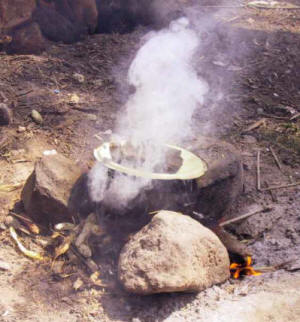 |
| Traditional three-stone fires cause health and environmental problems; integrated cooking methods are cleaner and safer |
As an alternative to cooking and heating water with firewood, Solar Cookers International (SCI) recommends an ecologically conscious integrated cooking approach that includes solar cookers, fuel-efficient stoves and heat retention devices. Solar cookers use solar energy, rather than biomass, to bring food or water to cooking and pasteurization temperatures. Fuel-efficient stoves use less fuel, produce less smoke, and cook faster than traditional stoves. Heat retention devices are able to continue cooking food previously heated to cooking temperatures, as well as keep food hot for up to six hours. Together these technologies drastically reduce the use of firewood to slow the rate of deforestation, enhance the local environment, significantly improve the health of women and girls, and curtail the already noticeable negative effects of climate change. Compared to inefficient charcoal-, wood-, and kerosene-fueled stoves, the integrated cooking method can reduce the workload for women, giving them time to enhance their quality of life and generate income.
These simple technologies can be manufactured and/or maintained locally, creating employment opportunities through production and sales. According to the World Health Organization (WHO), “a lack of access to modern cooking fuels and electricity represents a bottleneck, holding back progress.” The technologies that we recommend support United Nations Millennium Development Goals five, seven and eight by promoting gender equality and empowering women, ensuring environmental sustainability, and fostering a global partnership for development.
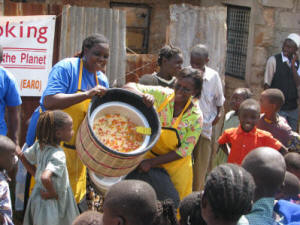 |
| Heat retention devices insulate cooking pots, continuing the cooking process without a heat source |
The villagers of the Gbehyi chiefdom in eastern Liberia have expressed a strong interest in creating sustainable income and obtaining clean water and electricity through green technology. Together with a Liberian organization specializing in community development and promoting local “eco-economies,” Empowerment Society International (ESI) is working to develop a Sustainable Village Initiative (SVI) in the Gbehyi chiefdom of Nimba County. The initiative would incorporate a variety of sustainable and appropriate technologies, providing renewable energy, safe water and cleaner air, as well as sanitation and food security measures. The SVI model will assure the provision of basic health and education services, housing, and economic revitalization, including the construction of a Sustainable Village Service Center (SVSC) to oversee the implementation of new technologies and provide opportunities for micro-business.
SCI hopes to design the solar and integrated cooking components of the SVI. Successful uptake of these cleaner technologies will reduce respiratory and waterborne disease among women and children, and reduce the negative effects of deforestation and carbon emissions in the region. Water pasteurization in a solar cooker cheaply and effectively improves health conditions by eliminating waterborne pathogens.
Community participants will be trained on the manufacture, promotion and implementation of these technologies. Project experience will provide useful inputs to the formulation process of Liberia’s national energy policy, and it is anticipated that these principles will be replicated in other parts of the country as an initiative to aid in the mitigation of, and adaptation to, climate change.
The integrated cooking and water pasteurization aspects of the SVI should
significantly decrease hunger, respiratory and waterborne diseases, and
deforestation in the area; increase food security, school attendance,
productivity and income generation; and promote gender equality and empower
women by providing opportunities for entrepreneurial prospects and participation
in micro-business.
Message from the executive director
Dear SCI Friends,
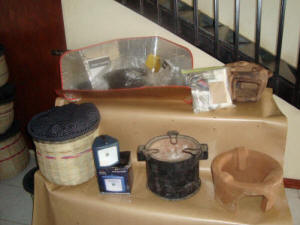 |
| Solar and integrated cooking devices on display in SCI’s Kisumu office |
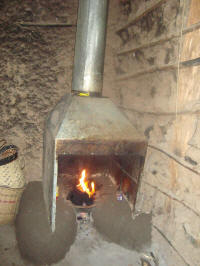 |
| Stove hoods channel smoke out of houses |
Some distance from SCI’s Western Province office in Kakamega, SCI eastern Africa Director Margaret Owino and I visited SWP beneficiaries in Emuhaya constituency. Families are spread out in this area dominated by steep hills and huge boulders, some over two stories tall. Most of the residents are farmers that grow corn, chick peas, kale or Napier grass in clear patches of ground between the boulders. Chickens, pigs and cattle are also common.
Some families we visited bring water up-hill from a pipe channeling water through the rocks in the hillside. The family living closest to the water lives six stories above the water source. Water is carried in 20-liter plastic containers, of which a family of four requires approximately six each day.
One SWP family we visited had two children, ages five and eight. We watched and listened as the eight-year-old girl explained to neighbors what SCI’s Water Pasteurization Indicator (WAPI) is used for and how it functions. The five-year-old boy showed us how he could fill his cup with solar pasteurized water from the SWP water storage container.
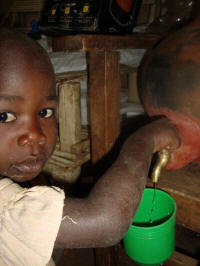 |
| Solar pasteurized water is kept free from contamination in clay water storage containers |
I am currently in Geneva, Switzerland, thanks to an individual who made a donation specifically for this trip and my travel to Kenya. I am attending the 2009 Annual Consultations between the United Nations High Commissioner for Refugees (UNHCR) and its NGO partners. This year’s meeting brings together more than 180 international and national NGOs to discuss a variety of issues ranging from displacement in urban settings and protracted refugee situations to security and staff safety. The Consultations provide an important forum for the nongovernmental sector to raise issues, network and exchange views with UNHCR. The informal gathering also allows NGOs and states to participate as equal partners, an approach that NGOs welcome.
The refugee agency sees partnerships with NGOs as the best way to ensure that the basic needs of refugees and populations of concern are met. In 2008 some 25% of UNHCR’s total expenditures were channeled through 635 NGOs. At this event, SCI, along with the NGO Committee on the Status of Women and the Working Group on Displaced Women, will have the opportunity for a “side meeting” to give a presentation titled “Integrated Solutions to Cooking Needs and Safe Water.” Displays that focus on SCI programs in Kenya will be part of that presentation.
While in Kenya, I met with UNHCR representatives to discuss a possible return to the refugee camps in Kenya to introduce integrated cooking centered on solar cooking.
One of the first meetings in Geneva was with our friend Derk Rijks, a KoZon volunteer. He has done a marvelous job with Tchad Solaire working in the refugee camps in Chad and brought me up-to-date on his recent activities. He said that in addition to solar cookers, refugees now have fruitful gardens that provide nutritious fresh vegetables. They are also manufacturing soap to sell for income and for their own needs, eliminating the need to import this product.
While in Geneva, I hope to meet with representatives of the World Health Organization (WHO) to discuss SCI’s participation in its 7th Global Conference on Health Promotion scheduled for October 26-30, 2009 in Nairobi. Prior to that event, we would like to meet with community groups that are involved in SCI programs in Kenya to learn what they consider to be useful and traditional health promotion practices.
This is an exciting time for SCI, with program efforts that are benefiting so many in the field. My most lasting impressions in recent times — the young boy drawing pasteurized water from a storage container and his sister explaining the WAPI to a group of amazed adults. Imagine their faces! I hope you will, and also hope that you will respond with your financial support to make these programs possible.
Be well and thank you,
Patrick T. Widner
SCI executive director
by Sierra Scott, SCI office manager
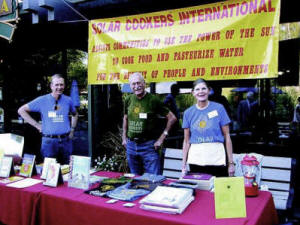 |
| Bill Hudson, Don Coan and Linda Hayward are among the many dedicated SCI volunteers that attend events and raise public awareness |
Our inclusion in green fairs and earth-friendly events is an obvious fit since
solar cookers have zero emissions and help save on energy consumption. As people
become more aware of preserving Earth’s precious resources, it becomes easier to
recruit new solar cooking enthusiasts. One of SCI’s tasks is to educate the
public about this simple, energy-saving way to cook food and pasteurize water,
and our team of demonstrators does an excellent job of making that happen. As we
roll into summer, we expect even more people to embrace the idea that the sun’s
scorching rays needn’t always be something to complain about — just as long as
you remember to wear sunscreen when cooking!
Thank you for your service, Dinah
 |
| Dinah Chienjo explains how solar cookers work at the United Nations in New York |
Dinah was selected from a strong pool of candidates to fill the position when it was first announced in 2002. Prior to joining SCI, she was a high school teacher for a number of years. She had also been active in a number of community organizations focusing on counseling, HIV/AIDS issues, and women’s rights.
At SCI, Dinah headed up a team of over 20 women who conducted solar cooker demonstrations, taught solar cooking skills, and sold solar cookers through micro-businesses. She was highly involved in project assessments, and was an advocate for solar cooking at numerous events, on radio programs, and was even featured as an SCI representative in a documentary about Africa conservation projects. Her work took her to various parts of Kenya, Ghana, and even the United States, where she participated in the 15th session of the United Nations Commission on Sustainable Development and demonstrated the practicality of using solar cookers to international diplomats, United Nations visitors, and a CNN reporter.
Upon learning that she had been hired for the position, Dinah recalled being
“excited, but also afraid, barely knowing the challenges that lay ahead. My task
as project officer was to work with a local community-based organization called
NYACODA, and together we were to introduce a new cooking technology in Nyakach.”
She continued, “Years down the line, I have no regrets, I am proud to have been
involved as facilitator and a beneficiary of the changes I am witnessing in my
community.”
Tribute gifts have been given to Solar Cookers International by:
- Carol N. Coan in honor of Don Coan
- Karyn Ellis in honor of Carolyn J. Ellis
- Lynne Gerred in honor of her father, Henry Thomas
- Linda and Gerald Hayward in memory of Caitlin Marie Smith
- Sarah Heend in honor of Jane Dunehew
- Charles Hosking in honor of his wife, Mary Anne Fiske
- Ellen Jensen in memory of Pauline Ludwig
- Joyce and Ken Kieffer in honor of Beth Holmes and Lori Yeich
- Nina Lubick-Reich in honor of her daughter, Lydia Coltman
- Jane R. Lurie in honor of Elaine Hilp
- Terry Mason in memory of his wife, Judith Ann Mason
- Burnett and Mimi Miller in memory of George W. Artz
- W. Ray Smith in memory of Doris Ryan
- David and Betty Strait in memory of her sister, Beulah Swan
- Karla Walsh in honor of her mother, Marcia Walsh
Remembering Gordon Magney and a quarter century of solar service to Afghans
by Kevin Porter, SCI director of education resources
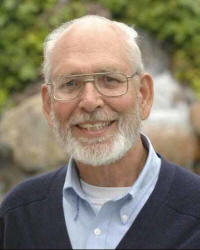 |
| Gordon Magney |
Along with his wife Grace, Gordon Magney devoted over 25 years of his life to the spread of solar cooking knowledge and skills in Afghanistan and Pakistan. When he passed away on October 5, 2008, the Afghan people lost a dear friend, and the international solar cooking community lost a tireless promoter and leader. He will be missed.
Gordon Magney was born in Tanzania to American parents in 1938. Magney developed a deep interest in Afghanistan while studying at Wheaton College in Wheaton, Illinois (USA). The Magneys moved to Afghanistan in 1969, and spent many years working on adult literacy issues in Kabul, even writing a set of Dari language primers that are still used today. In 1972 they organized food aid in response to a famine in the Ghor province of central Afghanistan, and also began a vocational training program for orphans. Known as SERVE (Serving Emergency Relief and Vocational Enterprises), these programs continued through 1974 when the situation improved.
Magney re-established SERVE in 1980 to provide emergency relief to Afghans who fled the Soviet invasion and were living in refugee camps in Pakistan. In a 1983 survey conducted by SERVE and United Nations experts, refugees revealed that their most urgent need was assistance in obtaining cooking fuel. Magney felt that solar cookers would be a boon in this region with nearly 300 sunny days each year. In a small pilot project, 50 families were given solar cooking training and loaned solar box cookers similar to models in India. By the end of the nine-month project, 80% of the families used solar cookers whenever possible. The cookers were modified based on project feedback, and a workshop was created to build solar cookers. The cookers cost $60-70 to produce, but were sold to refugees at a subsidized price of about $18.
Over time, many of the refugees returned to Afghanistan with their solar cookers. Friends and relatives saw these cookers and demand began to rise, due in part to the danger, during firewood collection, posed by landmines that were left from the war years. As an example of the level of demand, a shipment of 780 solar box cookers in a Kabul market sold out in five days. SERVE continued to provide solar cooker training and equipment in the region through the end of the 1990s, when subsidies dried up. Under Taliban rule, SERVE was forced to close in 2001 because it was considered to be a Christian organization. By then, Magney and SERVE had distributed more than 20,000 solar cookers in Pakistan and Afghanistan.
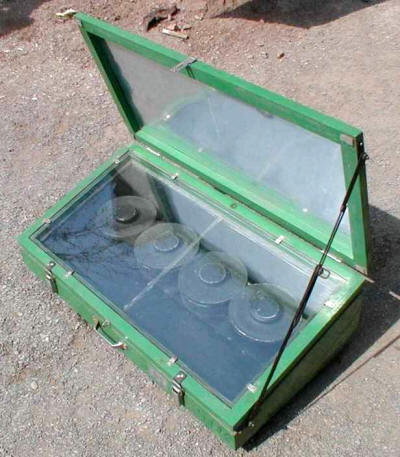 |
| Over 20,000 SERVE-built solar box cookers were distributed in Pakistan and Afghanistan |
In the past few years, the Magneys began to advocate the use of parabolic solar cookers which could be built in Afghanistan, creating employment and providing more families with a way to cook and boil water using Afghanistan’s abundant sunshine. Grace still resides in Kabul and is still active in the solar cooking advocacy work that she and Gordon began so many years ago.
In addition to his work in Afghanistan and Pakistan, Magney was also active in the worldwide solar cooking community. He and his wife attended several conferences and held leadership roles in working groups.
According to SERVE, Magney was buried in Kabul “in the country and among the peoples he loved.”
(Editor’s note: many of the details for this story came from the SERVE 2008
annual report, and Barbara Knudson’s manuscript “The State of the Art of Solar
Cooking.”)
Solar Cookers World Network (SCWNet) update
by Bev Blum, SCWNet secretariat
Regional networks encourage collaborations, mentor newer promoters toward more successes, and explore regional solutions to challenges. The Asia Pacific Net has already held two regional conferences (Nepal in 2007 and India in 2009). We’re also delighted to announce a fourth regional group — CUEZ.
Short for Canada/USA/Europe Zone, CUEZ is being revived by active promoter Sharon Cousins from Idaho, USA. She invites members to increase their focus on visibility, youth and homeless outreach, regional membership growth, and information sharing. For more information on this great networking opportunity, and to sign up for an occasional CUEZ-Net newsletter, visit solarcooking.org/scwnet and scroll down to the C/U/E section, or e-mail Cousins: writersguildgal@moscow.com. (Please put “solar” or “SCWNet” in the subject.)
SCWNet’s long and distinguished list of 250 members strengthens credibility when any of us seek loans or grants, or advocate on behalf of solar cookers. Collective advocacy helps educate skeptical policy makers to change unsustainable policies and to challenge inertia and risk aversion. For example, through Solar Cookers International’s United Nations (UN) representatives, SCWNet members provided the World Health Organization (WHO) with examples of local leadership having increased field project successes. These examples will be useful in preparation for WHO’s 7th Global Conference on Health Promotion in Nairobi later this year.
Want to be more active in SCWNet? Volunteers are needed for: a) advocacy at UN agencies in New York, Geneva and Nairobi; b) advocacy among government agencies for members living near their government centers; and c) exhibits and demonstrations at important conferences.
Up-scaling small successes is a problem for most promoters. If even one policy maker is ready to order tens or hundreds of thousands of solar food devices, who could fill that order today? Small successful programs are difficult to replicate on larger scales without participation and leadership from target populations. This requires humility by promoters, and committed partnerships that are by nature time-consuming and unpredictable. Too often, outsiders-driven projects fail, and bad press and cynicism affect all other promoters. The SCWNet Steering Committee is exploring ways to help a few members develop large-scale, turn-key packages of supplies, training and implementation with clear, competitive unit prices. With these in place, effective marketing must bring those packages to potential buyers: governments, UN agencies, businesses, nongovernmental organizations, and education and health institutions. Up-scaling also lowers unit prices and builds commercial and humanitarian confidence in our products. Ideas? Please contact us by e-mail: scwnet@solarcooking.org.
SCWNet, formerly Solar Cookers International Association, includes 100 independent organizations and 170 individual promoters in 50 countries. Its mission is to improve health, economies, societies and environments through collective actions to spread solar cooking, water pasteurizing and food processing. Its primary target is the billion (one thousand million!) people living in sunny, fuel-scarce regions, where less than 2% of people currently have access to simple solar solutions.
SCWNet is led by a steering committee of representatives from nine key promoter
agencies: SCI and Solar Household Energy, Inc. (USA), RECOSOL (Chile), CEDESOL
(Bolivia), Centre for Rural Technology (Nepal), Barli Institute, ICNEER and
PRINCE (India), Solar Food Process Net (Germany), and Solar Cookers Africa
(South Africa). To find out more and/or to join, visit solarcooking.org/scwnet
or e-mail scwnet@solarcooking.org.
Andres wins major prize for humanitarian efforts
by Kevin Porter, SCI director of education resources
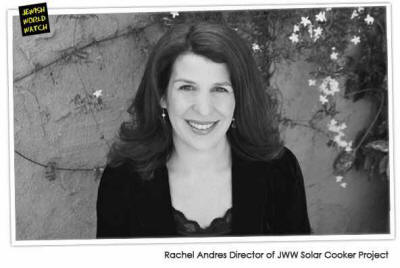 |
| Rachel Andres |
Andres directs the Jewish World Watch (JWW) Solar Cooker Project, which she launched in 2006 to aid female survivors of the Darfur genocide. “The genocide in Darfur is horrifying and people want to help but they don’t know how because the problem is so enormous,” said Andres. “The Solar Cooker Project gives caring individuals who would otherwise feel powerless a concrete way to help. It’s a message to our generation and the ones to follow that we can make a difference.”
Canadian Supreme Court Justice Rosalie Silberman Abella, a Prize judge, says Andres’ contribution “was to address the degradation and dehumanization of the female refugees who were being systematically and ruthlessly subjected to physical and sexual brutality when they left the relative safety of their refugee camps to get the firewood they needed for cooking.”
In 2006 Andres sought out solar cooker organizations that were working on behalf of Darfur refugees, and discovered the Dutch foundation KoZon, which was already working in Chad refugee camps, and Solar Cookers International (SCI), which had many years of experience teaching solar cooking in refugee camps and was helping to fund KoZon’s work. JWW immediately began to raise awareness and funds to support these efforts on the ground.
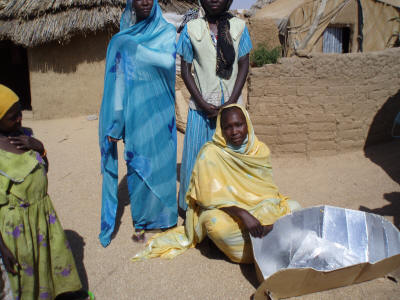 |
| Andres hopes the Solar Cookers Project will “empower the women of Darfur and help them recover from the atrocities they have endured." |
“The impact of the project was not just in the heroic reduction in danger for the refugee women, but also in the educational tributaries it inspired. All over America, young people began organizing fundraising events to contribute to the Solar Cooker Project. What Rachel created was affordable philanthropy. It taught youthful fundraisers not only how spiritually satisfying it was to make a difference, it gave them the satisfaction of knowing that even a small contribution can make an enormous difference. Thousands of Darfuri women, thousands of American young people, brought together in humane solidarity.”
In response to winning the Prize, Andres said, “My Jewish upbringing has taught me to protect the vulnerable — Jews and non-Jews alike. We can’t be so insular that we don’t see the problems of others, especially those who don’t have powerful voices to stand up for them. My vision is that within two to three years, we will have solar cooker projects functioning in all 12 refugee camps in Chad, and through that, empower the women of Darfur and help them recover from the atrocities they have endured.”
The Solar Cooker Project has already expanded into the neighboring camps of Touloum and Oure Cassoni, where dozens of trainers are spreading solar cooking knowledge and several thousand solar cookers are already in use.
Contact: The Charles Bronfman Prize, 110 East 59th Street, 26th Floor, New York,
New York 10022, USA. Tel: 212-931-0127, fax: 212-931-0080, e-mail:
info@thecharlesbronfmanprize.com, Web:
http://thecharlesbronfmanprize.com;
Rachel
Andres, Jewish World Watch, 17514 Ventura Blvd, Suite 206, Encino, California
91316, USA. Tel: 818-501-1836, e-mail:
info@jewishworldwatch.org, Web:
http://jewishworldwatch.org
 Solar Cookers International (SCI) received this heart-warming vignette from
Henry Ogola Oloo of the Amani Solution Self Help Group in Nairobi, Kenya. It is
inspiring to hear from Solar Cooker Review readers and to share in the spread of
solar cooking knowledge around the world. This serves as a good reminder to pass
on your Review to someone else when you are done with it, because you never know
what they might do with the newfound information!
Solar Cookers International (SCI) received this heart-warming vignette from
Henry Ogola Oloo of the Amani Solution Self Help Group in Nairobi, Kenya. It is
inspiring to hear from Solar Cooker Review readers and to share in the spread of
solar cooking knowledge around the world. This serves as a good reminder to pass
on your Review to someone else when you are done with it, because you never know
what they might do with the newfound information!
“Amani Solution is a community-based organization … mainly dealing with HIV/AIDS awareness, children’s education and poverty eradication.
“On one of our occasions we gathered [at a] members premises to discuss the progress growth in development of our community. By chance, I saw a piece of paper that was to be used for lighting fire to prepare our lunch. What kind of paper was this? It was a Solar Cooker Review dated July 2003.
“After reading part of it, I found it to be producing fire by itself. So instead of being used for the purpose of lighting fire, I mobilized members to understand the message contained [in it]. We used it for its real purpose of making fire.
“With member’s support of donations … we managed to make this box-type solar
cooker and it really worked. With solar, we will have an added opportunity to
ease the burden of the needy in collecting firewood and buying fuel, and that
will reduce poverty by 20% if initiated.”
 Solar Cookers International recently began tweeting on Twitter. (If you’re lost
already, check out twitter.com to learn more.) You can easily follow us on
Twitter by visiting http://twitter.com/solarcookersint and clicking “follow.” Use @solarcookersint
to send us a Tweet.
Solar Cookers International recently began tweeting on Twitter. (If you’re lost
already, check out twitter.com to learn more.) You can easily follow us on
Twitter by visiting http://twitter.com/solarcookersint and clicking “follow.” Use @solarcookersint
to send us a Tweet.
See you in cyberspace!
SCI remembers Solar Solutions supporter George Artz
 |
| George Artz and his daughter Deborah |
George remained an SCI advocate and friend, and enjoyed meeting with SCI’s Eastern Africa Director Margaret Owino whenever she was in town.
On behalf of thousands of families in western Kenya that now are able to cook
food and pasteurize drinking water with plentiful, free solar energy, we thank
you and remember your kindness. Rest in Peace.
by Donald Coan
Hey, don’t throw away that Jack-o’-lantern after Halloween has passed. Bake it in your solar cooker, scrape the flesh from the skin, and mash it with a potato masher. Then you’re ready to make Jack-o’-lantern pudding.
Mix together and put in a round, black pot for solar baking:
- 2 cups pumpkin (get a can if you must)
- ¾ cup sugar
- 1 teaspoon ground cinnamon
- ½ teaspoon ground ginger
- ¼ teaspoon ground nutmeg
- ¼ teaspoon ground cloves
- 3 beaten eggs
- 1 12-ounce can evaporated milk
On top, layer the following in order:
- 1 box yellow (or lemon) dry cake mix
- 1 cube butter (or margarine), melted and drizzled over cake mix
- ¼ cup (or more) shaved almonds
Replace the lid and bake for two to four hours in a solar cooker. (Or, use your
old gas/electric oven if you must. I don’t have any idea how long it will take;
I don’t have much experience with those things.)
New giving opportunity: support SCI with every credit card purchase!
 Through the Capital One® Card Lab Connect program, you can now sign up for a
“Solar Cooking & Safe Water” Visa® Platinum credit card and support Solar
Cookers International (SCI) every time you shop. One percent of each purchase
directly supports our vital work. As an added bonus, SCI gets $25 with your
first transaction!
Through the Capital One® Card Lab Connect program, you can now sign up for a
“Solar Cooking & Safe Water” Visa® Platinum credit card and support Solar
Cookers International (SCI) every time you shop. One percent of each purchase
directly supports our vital work. As an added bonus, SCI gets $25 with your
first transaction!
Show your support with our customized card. Apply today at http://www.CardLabConnect.com/solarcookingsafewater
This Card is issued by Capital One pursuant to a license from Visa U.S.A. Inc.
Credit approval required. Terms and conditions apply. Offered by Capital One
Bank (USA), N.A., member FDIC. © 2009 Capital One.
Donate your vehicle to Solar Cookers International (SCI) and receive a tax deduction! Through a partnership with Donation Line, Inc., SCI will benefit from the sale of your vehicle, even if it is inoperable. (A clear title is usually required.) You can donate cars, trucks, motorcycles, motor homes, buses, boats, jet skis, even snow mobiles.
To donate a vehicle, call toll free (877) 227-7487 extension 2403, or submit a vehicle donation form at http://donationline.com/newvehicle_donation_form.shtml and designate “Solar Cookers International” as the beneficiary. There is no cost to you. Your vehicle will be towed away, and after your vehicle is sold you will receive a formal letter from SCI certifying the donation.
Contact SCI Resource Development Coordinator Rene Hamlin for more
information on vehicle donations. She can be reached by telephone: (916)
455-4499, or by e-mail:
rene@solarcookers.org
Does your employer have a workplace giving campaign or matching gift program?
Fall is the season when many employers offer employees the option of giving through payroll deductions. Solar Cookers International (SCI) benefits from several major campaigns, including the Combined Federal Campaign (CFC), California and Washington state employee campaigns, and the Hewlett Packard employee giving campaign. If your place of work has a giving campaign, you can write Solar Cookers International in the donor option field and your donation will be sent to us.
There are advantages to giving through recurring payroll deductions. A modest amount taken out of each pay check adds up to a wonderful donation over the giving year, and provides a steady donation stream in support of SCI’s work. Some employers will even match the gift!
Even if your company does not run a workplace giving campaign, it may have a
matching gifts program. We receive matching gifts from many companies, including
Adobe, Intel and Wachovia. Check with your human resources or public relations
department to see if this opportunity is available.
Give AND receive with an SCI charitable gift annuity
You’ve probably heard the phrase “it is better to give than to receive.” But did you know that it is possible for you to give AND receive? How does the idea of receiving a generous fixed income, guaranteed for life, sound to you? Through its established partnership with the Sacramento Region Community Foundation (SRCF), Solar Cookers International (SCI) offers you the benefits of investing in charitable gift annuities, which ultimately enable us to build our endowment and help support our future programs.
The benefits you receive when you establish a charitable gift annuity may include:
- Immediate income tax deduction
- Generous fixed income, guaranteed for life
- Avoidance of capital gains tax on the sale of appreciated assets
- Reduction of potential estate tax
- Consolidation of several stocks or accounts into one income source
A charitable gift annuity benefiting SCI is a simple agreement between you and SRCF, in which — for an irrevocable gift of cash and/or securities — SRCF agrees to make fixed payments to you for your life. The payout rate is based upon your age at the time of the gift.
Sample charitable gift annuity rate chart (2/1/2009):
| Age | Payout Rate |
| 60 | 5.0% |
| 65 | 5.3% |
| 70 | 5.7% |
| 75 | 6.3% |
| 80 | 7.1% |
| 85 | 8.1% |
| 90 | 9.5% |
Would you like to see a personalized charitable gift annuity illustration? We can provide one! Just call SCI Resource Development Coordinator Rene Hamlin at (916) 455-4499 and we’ll get started. It’s free and there is no obligation. Please call today.
Note: the minimum gift amount is $10,000. Before implementing any plans, be sure
to seek the advice of your professional tax or financial advisor. Calling all U.S. federal employees!
Federal employees have the option of supporting SCI with either a one-time
gift or with recurring payroll deductions. For those interested in joining
the effort, our CFC number is 11023. This code directs your donation to
SCI’s Africa programs. Information is available on-line at aidforafrica.org/members.php?id=43.
Your questions are also welcomed by SCI Resource Development Coordinator
Rene Hamlin. You can reach her by telephone: (916) 455-4499, or e-mail:
rene@solarcookers.org
Thanks, federal employees, for your philanthropy and involvement in the
effort to spread this sustainable solar solution.
 Are
you a federal employee? Do you know one? Solar Cookers International (SCI) has
again qualified as a participating organization in the Combined Federal Campaign
(CFC). SCI is a beneficiary of the effort through the Aid for Africa Federation.
We are proud to meet the rigorous financial, accountability, and governance
standards, and ask for your CFC support.
Are
you a federal employee? Do you know one? Solar Cookers International (SCI) has
again qualified as a participating organization in the Combined Federal Campaign
(CFC). SCI is a beneficiary of the effort through the Aid for Africa Federation.
We are proud to meet the rigorous financial, accountability, and governance
standards, and ask for your CFC support.
Solar Cooker Review (“Review”) is published two or three times per year with the purpose of presenting solar cooking and solar water pasteurization information from around the world. Topics include solar cooker technologies, dissemination strategies, educational materials, and cultural and social adaptations. From time to time we cover related topics such as women’s issues, wood shortages, health, nutrition, air pollution, climatic changes, and the environment.
The Review is sent to those who contribute money or news about solar cooking projects. The suggested subscription price is $10/year. Single copies are sent free to select libraries and groups overseas.
We welcome reports and commentary related to solar cooking for possible inclusion. These may be edited for clarity or space. Please cite sources whenever possible. Send to Solar Cookers International (SCI), 1919 21st Street #101, Sacramento, California 95811-6827, USA. You may also submit by fax: +1 (916) 455-4498 or e-mail: kevin@solarcookers.org.
The Review is compiled and edited by Kevin Porter, SCI’s director of education resources, with assistance from other staff. Layout is graciously donated by IMPACT Publications located in Medford, Oregon, USA.
SCI is a 501(C)(3) nonprofit organization assisting communities in using the power of the sun to cook food and pasteurize water for the benefit of people and environments. SCI is a member of InterAction. We do not sell, rent or trade names of donors. Tax ID # 68-0153141.
The Review is available on-line at http://solarcooking.wikia.com/scr
